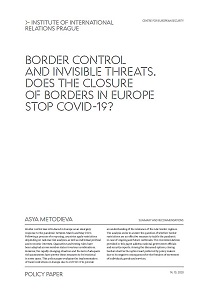Border control and invisible threats. Does the closure of borders in Europe stop COVID-19?
Border control and invisible threats. Does the closure of borders in Europe stop COVID-19?
Author(s): Asya Metodieva
Subject(s): Government/Political systems, Security and defense, Comparative politics, Health and medicine and law, EU-Approach / EU-Accession / EU-Development
Published by: Ústav mezinárodních vztahů
Keywords: Border control; COVID-19; Europe; public health security; international cooperation;
Summary/Abstract: Border control was introduced in Europe as an emergeny response to the pandemic between March and May 2020. Following a process of re-opening, countries apply restrictions depending on national risk analyses, as well as individual political and economic interests. Quarantine and testing rules have been adopted across member states in various combinations. However, the rapidly changing situation and the lack of adequate risk assessments have proven these measures to be irrational in some cases. This policy paper evaluates the implementation of travel restrictions in Europe due to COVID-19 to provide an understanding of the relevance of the new border regimes. The analysis seeks to answer the question of whether border restrictions are an effective measure to tackle the pandemic in case of ongoing and future outbreaks. The recommendations provided in this paper address national government officials and security experts. Among the discussed options, closing borders shall be the option least preferred by policy makers due to its negative consequences for the freedom of movement of individuals, goods and services.
Series: IIR - POLICY PAPERS
- Page Count: 8
- Publication Year: 2020
- Language: English
- Content File-PDF

